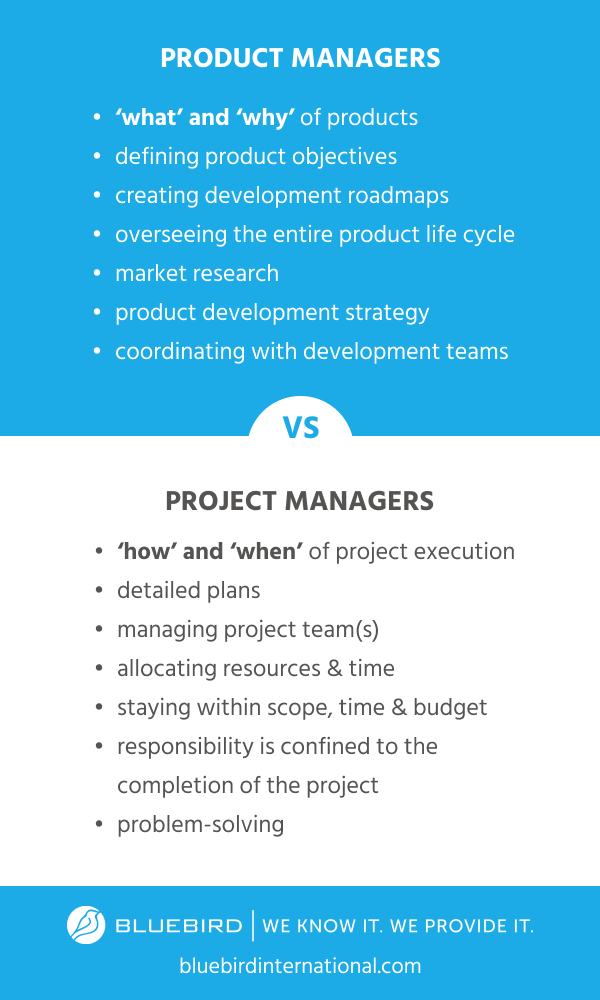Product Manager vs Project Manager: Understand key differences and overlaps in their their roles, responsibilities, career paths & more.
More...
Product Managers and Project Managers play distinct roles in the software development process, yet their responsibilities, tasks, and objectives can sometimes blur at the edges. This article provides a comprehensive overview of the two roles, making it simpler for you to discern where each professional fits in the domain of software development.
Whether you are considering a career in one of these fields or are an organization looking to hire, this article has you covered. Let’s get started!

Product Manager vs Project Manager: Key Differences
Product Managers are strategy-oriented professionals who concentrate on the ‘what’ and ‘why’ of a product. They envision the product, define its objectives, and create a roadmap for development, ensuring it meets market needs and organizational goals. Their objective is to deliver a product that offers value to users and drives business growth.
Project Managers, conversely, focus on the ‘how’ and ‘when’ of the project execution. They work with a detailed plan outlining each step of the development process, allocating resources and managing time effectively to ensure the timely delivery of the project. Their primary objective is successful project completion within the predetermined scope, time, and budget.
Responsibility Scope
In terms of responsibility, a Product Manager oversees the entire life cycle of a product, from ideation to market release and sometimes even beyond. They are involved in market research, product development strategy, and coordination with the development team to ensure the product aligns with the vision and goals set.
Project Managers have a narrower scope of responsibility. Their role is confined to the successful completion of the project at hand. They create a project plan, manage the project team, handle resource allocation, and solve problems that may arise during the development process, ensuring the project stays on course.
Skill Set
Product Managers need a balanced skill set of technical knowledge, market insight, and strategic thinking. They should understand user needs, be able to define product strategy, and communicate effectively with both the development team and stakeholders.
Project Managers require strong organizational, leadership, and problem-solving skills. They need to be adept at project planning, risk management, and resource allocation, ensuring that the project progresses smoothly from initiation to closure.
Key Takeaways
- Product Managers focus on strategy, vision, and the overall product life cycle, working from conception to market release.
- Project Managers concentrate on planning and executing projects efficiently within the predetermined scope, time, and budget, managing each step of the process meticulously.

Product Manager Roles and Responsibilities
Role Focus
Strategy and Vision
Product Managers are the visionaries behind a product. They cultivate and articulate the strategy and vision of a product, ensuring that it is innovative, marketable, and aligned with the business's overall objectives and goals.
Development Oversight
They play a pivotal role in steering the product development process from ideation to launch. This oversight includes working closely together with various teams to guarantee the final product mirrors the initially conceptualized vision and strategy.
While they don't need to be engineers, a good grasp of technology and technical concepts is crucial for Product Managers to work effectively with the development team and make informed decisions.
Skills Required
Strategic Thinking
To formulate the vision and strategy for the product, Product Managers need to think strategically, understanding the market landscape, competition, and customer needs.
Communication Skills
Product Managers need exceptional communication skills to convey their vision and strategy to different stakeholders, including team members, executives, and customers.
Data Analysis
With data playing a pivotal role in decision-making, Product Managers need to be adept at analyzing data to derive insights that inform their strategies and decisions. Examples include consumer behavior analysis, market trend analysis, feedback and review mining, and performance metrics analysis.
Technical Proficiency
Product Managers must possess a nuanced understanding of market demands and user needs, which informs the development of a product that effectively addresses these aspects. This enables them to establish realistic and lucrative business goals.
For instance, if a Product Manager is working on a Fintech application, they should understand the regulatory environment, compliance requirements, and security protocols necessary to protect user data. They need to be aware of trends in the financial industry, common challenges customers face, and the competitive landscape of fintech applications.
Tool Utilization
Familiarity with various tools is essential for Product Managers. They utilize product management software and analytics tools to aid in strategy formulation, planning, and performance monitoring, ensuring a smooth development process and a successful product launch.
Product Managers leverage strategic planning tools like
Each of these tools offers specialized functionalities that support various stages of product development and management, from ideation and planning to monitoring and analysis.
Collaboration & Communication
Communication and collaboration are at the heart of a Product Manager's role. They liaise with cross-functional teams, stakeholders, and executives, articulating the product's strategy and vision while gathering invaluable feedback that influences the product's development and final output.
Business Impact
The work of Product Managers significantly impacts the business. Through their strategic planning and development oversight, they directly influence the product’s success in the market and, consequently, the company's revenue and growth.
Project Manager Roles and Responsibilities
In the conversation around product manager vs project manager, understanding the distinct responsibilities and roles of a Project Manager is crucial.
Role Focus
Project Execution
Project Managers are responsible for the meticulous planning, execution, and delivery of projects. Their work ensures that projects align with the set objectives, completed on time, and within the allocated budget. While Product Managers may oversee a product throughout its lifecycle, Project Managers have a focused responsibility limited to the duration of a specific project.
Delivery Assurance
They offer the assurance that projects not only meet but preferably exceed expectations, providing value to both the business and the end-users.
Technical Proficiency
Proficiency in project management methodologies and tools is non-negotiable for Project Managers. This technical know-how is vital in effectively guiding the project from initiation through to completion.
Tool Utilization
Project Managers are adept at using various project management software and tools. These resources are indispensable in planning, executing, monitoring, and closing projects, ensuring that each phase is executed efficiently and effectively.
They commonly utilize tools like:
Collaboration & Communication
Seamless collaboration and communication are fundamental for Project Managers. They work in tandem with various team members and stakeholders to facilitate smooth project progression, addressing concerns, providing updates, and ensuring that the team is aligned with the project’s objectives and timeline.
Business Impact
The role of a Project Manager has a tangible impact on meeting organizational objectives. Through effective planning and execution, they guarantee that projects are not only completed successfully but also contribute value to the organization’s bottom line.
Product Manager vs Project Manager: Possible Role Overlaps
The overlap between Product Managers and Project Managers in organizations is variable, often depending on the company's size, structure, and the complexity of projects.
Large corporations and enterprises tend to have well-defined roles with minimal overlap, as they have the resources to hire specialists for each position. Here, the Product Manager typically focuses solely on product strategy, development, and lifecycle, while the Project Manager centers on project planning, execution, and delivery. However, effective communication and collaboration between the two roles are crucial in these settings to ensure alignment between product strategy and project execution.
In startups and smaller companies, it's common to witness significant overlap due to resource constraints and a lean approach to operations. Here, professionals might wear multiple hats, with Product Managers taking on project management responsibilities and vice versa. In medium-sized organizations, there might be a moderate overlap.
Furthermore, the industry or sector the company operates in can also influence the degree of overlap. In tech or product-centric industries, the distinction between the two roles might be more blurred compared to traditional sectors.
Product Manager vs Project Manager: Career Paths
Product Manager Career Path
The career path of a Product Manager often begins with an entry-level or junior role in the product team or a related field, and it progresses as they gain experience and expertise.
Entry-Level (Associate Product Manager)
At this stage, individuals usually assist senior Product Managers, participate in market analysis, and contribute ideas during the ideation phase.
Mid-Level (Product Manager/Senior Product Manager)
With experience, they take ownership of products, leading the strategy, development, and launch processes. They might also mentor junior team members.
Senior-Level (Director of Product Management/VP of Product)
At senior levels, they're responsible for overseeing multiple products or an entire product portfolio, making high-level strategic decisions and collaborating closely with executive leadership.
Executive-Level (Chief Product Officer)
In this role, individuals oversee the organization's entire product strategy, development, and launch initiatives, playing a pivotal role in the company’s success.
Project Manager Career Path
A Project Manager's career trajectory often starts with roles that are more operational or supportive in nature, eventually leading to strategic, leadership positions as they accumulate experience and skills.
Entry-Level (Junior Project Manager/Project Coordinator):
Initially, they assist experienced Project Managers in overseeing projects, focusing on coordination, documentation, and basic project planning.
Mid-Level (Project Manager/Senior Project Manager):
At this level, they take full responsibility for planning, executing, and closing projects. They also start to handle more complex and high-stakes projects, possibly leading a team of junior Project Managers.
Senior-Level (Program Manager/Project Director):
Individuals oversee multiple projects or programs, ensuring they align with the organization’s strategic objectives. They often manage other Project Managers and coordinate resources across various projects.
Executive-Level (VP of Project Management):
At the executive level, they're responsible for the overall direction and management of projects and project teams across the organization, influencing the company’s project management methodologies and best practices.

Switching Between Roles: Feasible?
Switching between Product Manager and Project Manager roles is entirely feasible. Professionals may seek a change for career advancement, diversification of skills, or a shift in interest towards either strategic product vision or project execution processes.
The ease of transition relies on the individual’s adaptability, the skills they have acquired, and their understanding of each role's nuances, among other factors. While both roles require management proficiency, they focus on different aspects of a project or product, demanding a mental shift and a different approach to daily tasks and long-term goals.
Skills Transfer
There is a substantial skills transfer between the two roles. Both Product and Project Managers need excellent communication, leadership, and analytical skills, as they regularly interact with various stakeholders, lead teams, and make data-driven decisions. However, the application of these skills differs.
For instance, while a Product Manager might use analytical skills to understand market trends and customer needs, a Project Manager applies them to optimize resources and timelines. Understanding this distinction is crucial for a smooth transition, and additional training or mentoring may be required to fully grasp the specific demands and responsibilities of the new role.
Continuous Learning
Continuous learning is key for successful role transition and career advancement in either position. Professionals should actively engage in industry seminars, workshops, and conferences, pursue relevant certifications, and possibly further their formal education.
As usual, staying up-to-date on the latest industry trends, technologies, and best practices is vital, as is networking with other professionals in the field. This also enhances competence and value in the marketplace.
Key Takeaways
- Switching between Product and Project Manager roles is entirely possible.
- Both roles share core skills like communication, leadership, and analysis but apply them differently.
- Continuous learning and staying updated on industry trends are crucial for successful transitions and career growth in either role.
Product Manager Vs Project Manager: FAQ
While beneficial, it's not mandatory. What’s crucial is understanding the software development process and being able to communicate effectively with technical teams.
Product Managers typically have more direct interaction with clients or end-users to understand their needs and feedback regarding the product.
Product Managers are often evaluated on the success of their products in the market, while Project Managers are assessed based on the successful execution and delivery of projects.
Certifications and education will enhance job prospects but are not always mandatory. Experience, skills, and the ability to deliver results are highly valued.
In tech or product-centric industries, the roles might blur more compared to traditional sectors where roles may be more clearly defined.
Both roles face the challenge of coordinating with remote teams, but the impact varies depending on the organization's remote work infrastructure and the individual's adaptability to remote work dynamics.
While both manage risks, Project Managers typically focus on risks related to timeline, resources, and scope, while Product Managers look at market and product-related risks.
Transitions between the two roles occur, often driven by personal career goals, project requirements, or company needs. The skills acquired in one role can be valuable in the other.
We hope you enjoyed our article on the differences between the role of a Product Manager and a Project Manager.
If your company is looking for IT professionals and you are interested in IT recruitment or IT staff augmentation, please contact us and we will be happy to help you find the right person for the job.
To be the first to know about our latest blog posts, follow us on LinkedIn and Facebook!